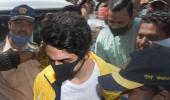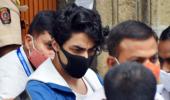The Narcotics Control Bureau (NCB) on Friday gave a clean chit to Aryan Khan, son of Bollywood superstar Shah Rukh Khan, in last year's 'drugs on cruise' case in which he was arrested and spent 22 days in jail.

Officials of the NCB, which filed its chargesheet in a Mumbai court, said Aryan Khan and five others had not been named due to 'lack of sufficient evidence'.
NCB chief S N Pradhan said, "We have gone by the principle of evidence."
"We found physical and circumstantial evidence against 14 persons and against six there was insufficient evidence," Pradhan said in Delhi.
"We considered all facts found during the initial investigation and found no concrete evidence (against Aryan)," he said.
Asked if Shah Rukh Khan was questioned, he said, "Some concerned individuals were questioned, but can't comment on names."
Aryan Khan's lawyer Mukul Rohatgi said truth has prevailed.
"I am relieved, and so must my clients be, including Shah Rukh Khan. The truth has prevailed. Ultimately, there was no material to charge this young man (Aryan Khan) or arrest him," he said.
NCB admitted its mistake and realised that there was no reason to proceed against Aryan Khan, he told a TV channel.
"I am very relieved and am sure that the young man and his father are equally relieved," he said.
Asserting that its special investigation team (SIT) carried out its probe in an 'objective manner', the federal anti-drugs agency said in a statement that 'the touchstone of the principle of proof beyond reasonable doubt has been applied'.
'Based on the investigation carried out by the SIT, a complaint against 14 persons under various sections of the NDPS Act is being filed (before a Mumbai court). Complaint against rest 6 persons is not being filed due to lack of sufficient evidence,' it said.
It added that eight people were arrested by the NCB's Mumbai zonal office on October 2 last year from the international cruise terminal and the vessel that was operated by a company called Cordelia.
The accused were Vikrant, Ishmeet, Arbaaz, Ayan, Gomit, Nupur, Mohak and Munmun.
'All the accused persons were found in possession of narcotics except Aryan (Khan) and Mohak (Jaiswal),' the NCB said.
Aryan Khan was released on October 30 from Mumbai's Arthur Road jail, 26 days after he was arrested in connection with the drugs case, after being granted bail.
The NCB submitted its chargesheet before the registry and the special NDPS court will take cognizance after verification of the documents.
In March this year, the special court had granted the probe agency a 60-day extension to file the chargesheet.
Arrests in the case were made by the NCB zonal office under its former director Sameer Wankhede and his team.
On November 6 last year, the NCB headquarters removed Wankhede from the probe and transferred the case and five more from Mumbai to a Delhi-based SIT formed under its deputy director general (operations) Sanjay Kumar Singh.
Hailing NCB's clean chit to Aryan Khan, the ruling NCP in Maharashtra asked who would be held responsible for the trauma he suffered.
It also said that the then zonal director of the NCB, Sameer Wankhede, was answerable to the people of this country.
Ally Congress alleged that the entire case was part of a 'larger conspiracy' to topple the Maha Vikas Aghadi (MVA) government, in which it shares power with the Shiv Sena and NCP.











 © 2025
© 2025